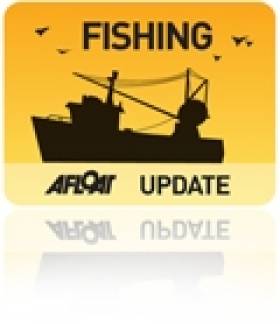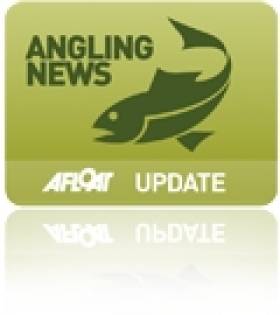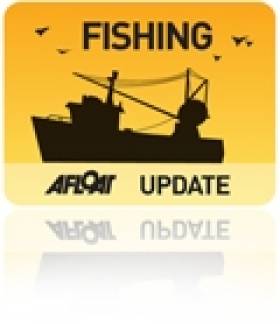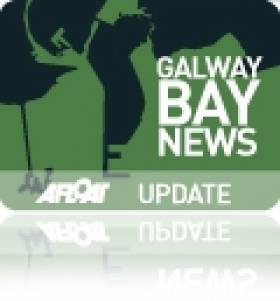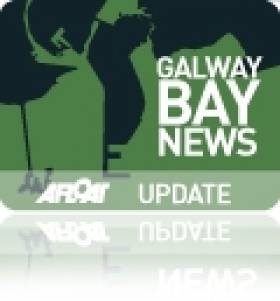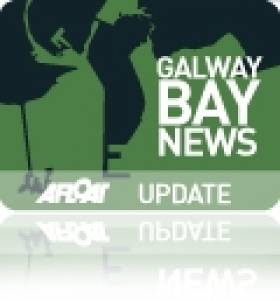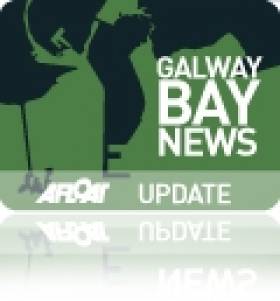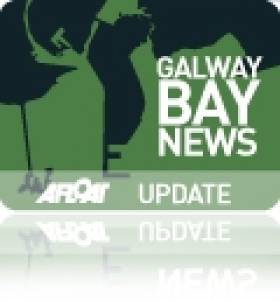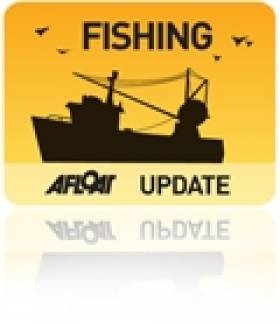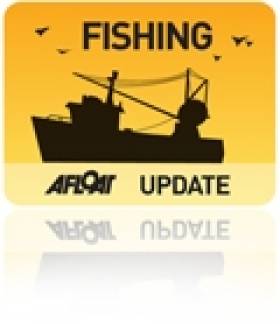Displaying items by tag: Bord Iascaigh Mhara
Morning Ireland Reports On Galway Bay Fish Farm Debate
#FishFarm - RTÉ Radio 1's Morning Ireland reports on last night's public meeting in Galway on the proposed deep sea fish farm in Galway Bay.
As previously reported on Afloat.ie, the 500-hectare organic salmon farm proposed by Bord Iascaigh Mhara (BIM) would be located off Inis Oírr in the Aran Islands, and would be the largest of its kind in Europe, set to double the State's production rate of organic salmon.
BIM's aquaculture development manager Donal McGuire moved to reassure concerned locals that the agency was "not about to damage [its] reputation" by "doing something foolish or doing something that will cause serious environmental damage".
McGuire added that organic salmon is Ireland's leading organic food export but is in "very very short supply", and that business would be lost to producers in Scotland and Norway.
However, the scheme has faced strong opposition from fisheries groups and local anglers citing the potential environmental impact on wild salmon numbers and the threat to tourism in the area.
At last night's meeting, RTE's western correspondent Pat McGrath says just two of the more than 100 in attendance spoke in support of the fish farm plans.
Another public meeting on the proposals is scheduled for tonight in Rossaveal.
BIM is expected to hold a public tender process for the proposed salmon farm project pending approval by Marine Minister Simon Coveney.
IFI Repeats Concerns Over Aran Islands Fish Farm
#Angling - Anglers on the River Feale in Kerry and Limerick have been assured by Inland Fisheries Ireland (IFI) that it supports their concerns over the proposed deep-sea fish farm in Galway Bay, as the Limerick Leader reports.
Local anglers are among those throughout the region who have rallied in opposition to plans for the Aran Islands fish farm project, over fears that it would lead to “an explosion” in parasitic sea lice which would prey on wild inland salmon from Irish rivers feeding in the North Atlantic.
IFI reiterated its statement issued last month in which its board said it does not believe "that the corpus of peer reviewed international scientific literature which recognises the negative impacts of sea lice on salmonids have been adequately dealt with" in the Environmental Impact Statement prepared by Bord Iascaigh Mhara (BIM) as part of the public consultation process.
A spokesperson for IFI told the Limerick Leader that the authority has "major concerns about the location and scale [of the farm], as well as its potential impact on sea life. [IFI] is not supporting it in its current form.”
Earlier this month the National Inland Fisheries Forum also criticised as "flawed" the consent process regarding the 15,000-tonne organic salmon farm planned off Inis Oirr, which would be the largest of its kind in Europe.
If approved, the operation could more than double Ireland's current production rate of farmed salmon.
The Limerick Leader has much more on the story HERE.
BIM to Hold Public Tender for Galway Bay Fish Farm
#FISHFARM - Bord Iascaigh Mhara (BIM) is set to hold a public tender process for the development of the proposed deep sea fish farm in Galway Bay, according to The Irish Times.
Financiers around the world have expressed interest in the 500-hectare organic salmon farm to be located off Inis Oirr in the Aran Islands, though BIM said it was not at liberty to disclose who they are.
As previously reported on Afloat.ie, the proposed fish farm would be the largest of its kind in Europe, set to double the State's production of organic salmon.
BIM says it is already receiving inquiries for jobs from emigrants wishing to return home.
However the scheme has faced opposition from Inland Fisheries Ireland (IFI) and local anglers, who cite the potential threat to wild salmon numbers in the area.
IFI recently issued a statement regarding its submission on the project's Environmental Impact Statement, raising concerns about the scale of the development and the impact of sea lice - infestations of which are often concentrated by aquaculture.
The public consultation that began in mid-October is scheduled to conclude next Wednesday 12 December.
Angling Writer 'Deeply Concerned' Over Aran Islands Fish Farm Plans
#GALWAY FISH FARM - In his latest angling column for The Irish Times, Derek Evans writes of his 'deep concern' over the proposed deep sea salmon farm off the Aran Islands in Galway Bay.
Making reference to new research that shows infestations of sea lice - which often concentrate in fish farms - pose a significant threat to the survival of wild salmon fisheries, as previously reported on Afloat.ie, Evans writes that the "untold damage" from such infestations would be "nothing short of catastrophic".
He adds: "While this latest proposal is a step in the right direction in terms of its 'off-shore' location, nevertheless, it will bring a plethora of problems, beginning with the size of its annual output and the 'baggage' that entails if and when it moves into unchartered waters."
Evans also points to the submission on the Environmental Impact Statement (EIS) made by Inland Fisheries Ireland (IFI), which includes "an additional checklist for consideration including the location and dimension of this proposed farm; site characteristics; production process; potential impacts; monitoring; and organic farming", as well as suggesting an assessment of all wild salmon fisheries in the affected area, plus a full monitoring system and baseline study.
Evan's comments come in the wake of IFI's dispute with Bord Iascaigh Mhara over the exclusion from the statutory consultation of a report critical of the proposed salmon farm off Inis Óirr, which has faced opposition from local salmon anglers.
The Irish Times has much more on the story HERE.
IFI Board Issues Statement on Galway Bay Fish Farm
#GALWAY FISH FARM - The board of Inland Fisheries Ireland (IFI) has issued a statement on the proposed Aran Islands deep sea salmon farm in Galway Bay, which has been the source of some controversy in recent weeks.
The board said it agrees with the recent statement by Minister Fergus O’Dowd on offshore salmon farming, and that it welcomes the development of Ireland’s aquaculture sector "once any development complies with Ireland’s obligations under relevant EU environmental legislation, particularly the Habitats Directive, and does not adversely affect salmon and sea trout stocks."
In addition, the IFI board said it has made a submission on the Environmental Impact Statement (EIS) prepared by Bord Iascaigh Mhara (BIM) for the proposed offshore salmon farm as part of the public consultation process, which is available on the IFI website.
As previously reported on Afloat.ie, the public consultation period began last month for the 500-hectare organic fish farm to be located off Inis Oirr. BIM has applied for a deep sea salmon farming licence at the site, which would be one of the largest of its kind in Europe. If approved, the operation could more than double Ireland's current farmed salmon production rate.
The IFI board's statement notes: "In the submission, concerns were raised in relation to the location and scale of the proposed salmon farm and how its development and operation could impact on wild salmon and sea trout stocks and their habitat.
"These concerns are based on scientific reports by respected authors and knowledge of the impact of existing fish farms on salmon and sea trout populations off the west coast of Ireland."
The submission also highlights "recent peer reviewed international scientific literature on the impacts of sea lice on salmonids" which poses a significant threat to wild salmon in Irish waters, as reported on Afloat.ie.
The board said it does not believe "that the corpus of peer reviewed international scientific literature which recognises the negative impacts of sea lice on salmonids have been adequately dealt with in the EIS".
While welcoming "any sustainable initiative which will provide jobs in rural coastal communities", the IFI board said it questions the figure of 500 jobs it's been reported the 15,000-tonne fish farm project would create, making comparison to a new 2,000-tonne aquaculture scheme in Scotland that's expected to create just four full-time positions.
The board members say they "have serious concerns that whatever the number of jobs created by the current proposal, they will be more than offset by the associated loss of jobs in the recreational angling and tourism sectors" if the scheme results in any negative effects on those areas.
"Ireland's reputation as a pristine wild fishery destination must be safeguarded," they added, noting that proposals for two further offshore salmon farms in Mayo and Donegal "are premature given that significant issues over the current proposal have not yet been resolved.
"No further applications should be progressed until all stakeholders are satisfied that the current proposal is sustainable and has no adverse impact on wild salmon and sea trout stocks."
Inland Fisheries Ireland is the State agency charged with the conservation, protection, development management and promotion of Ireland's inland fisheries and sea angling resource.
BIM Brings Fish Farm Consultation to Aran Islands
#GALWAY FISH FARM - Galway Bay FM reports that a series of direct public consultations on the proposed Aran Islands fish farm in Galway Bay will begin this week.
Bord Iascaigh Mhara (BIM) is organising the meetings on the islands and in nearby Galway City to allow the public to view its proposals for what would be one of the largest aquaculture operations in Europe.
As previously reported on Afloat.ie, the public consultation period began last month for the 500-hectare organic fish farm to be located off Inis Oirr. BIM has applied for a deep sea salmon farming licence at the site some 6km off the island.
If approved, the operation could more than double Ireland's current farmed salmon production rate.
The scheme has faced opposition from local anglers and from Inland Fisheries Ireland, who claim it poses a risk to wild salmon stocks.
But BIM has condemned IFI's "stop everything" attitude regarding the fish farm proposals, while accusing environmental campaigners of being "deliberately alarmist", according to the Galway Independent.
Lobby group Friends of the Irish Environment entered a dispute with the sea fisheries board over the exclusion of an IFI report critical of the salmon farm from the statutory consultation.
“In the current climate, with jobs being as scarce as they are and economic development being the way it is, I think really that sort of attitude, that sort of museum curator ‘stop everything’ attitude is not good enough,” said BIM aquaculture development manager Donal Maguire.
Campaigners In Dispute with BIM Over Galway Bay Fish Farm Report
#GALWAY FISH FARM - Environmental campaigners have retracted their accusation that Bord Iascaigh Mhara (BIM) suppressed a report critical of the proposed deep-sea fish farm in Galway Bay.
The Galway Independent reports on a statement released by lobby group Friends of the Irish Environment, which claimed that BIM tried to hide the study by not posting it on its website along with other materials made available for the public consultation period.
The report in question was commissioned by Inland Fisheries Ireland and is critical of the Environmental Impact Statements carried out on the proposed location for the 15,000-tonne organic salmon farm off the Aran Islands.
As previously reported on Afloat.ie, the salmon farm would be located on a 500-hectare site off Inis Oírr, and would be one of the largest of its kind in Europe, projected to be worth €103 million annually for the economy. The scheme has faced opposition from local anglers who fear it could have a negative impact on wild salmon numbers.
BIM strongly denied any wrongdoing, and the lobby group subsequently retracted its allegations upon learning that the IFI report had missed the deadline for submissions for the consultation.
“BIM certainly did not suppress or ignore or gloss over anything from IFI, because we never received anything," said a BIM spokesperson.
However, Friends of the Irish Environment now alleges that the IFI report was late due to a delay in their receipt of the Environmental Impact Statement from BIM.
The Galway Independent has more on the story HERE.
Public Consultation on Galway Bay Fish Farm Set to Begin
#GALWAY FISH FARM - Galway Bay FM reports that a full public consultation on proposals for what's set to be Europe's largest fish farm off the Aran Islands is scheduled to begin next week.
As previously reported on Afloat.ie, the 15,000-tonne deep-sea organic salmon farm would be located on a 500-hectare site in Galway Bay off Inis Oírr, and would be one of the largest of its kind in Europe, projected to be worth €103 million annually for the economy.
The statutory consultation period ended earlier this month after delays over the summer in publishing the licence application. And from next Monday 15 October, Bord Iascaigh Mhara (BIM) will make the plan and all statutory feedback available to the public via its website at www.bim.ie.
Advertisements announcing the consultation will appear in local and national newspapers, and packs will also be available to view for locals at Kilronan and Salthill Garda stations, including copies of the environmental impact statements and information on the statutory consultation process.
BIM aquaculture development manager Donal Maguire told Galway Bay FM that transparency is key to ensuring the public had all the information they need regarding the scheme - which has faced opposition from local anglers who fear the fish farm could have a negative impact on wild salmon numbers.
BIM Decries 'Scare Tactics', Urges Support for Fish Farming
#FISHING - Bord Iascaigh Mhara (BIM) has called on environmental campaigners opposed to changes in the current fish farm licensing system to "get behind Ireland's aquaculture industry".
In a letter to The Irish Times yesterday, the fisheries board wrote in response to Tony Lowes of Friends of the Irish Environment, whose own letter to the paper on Tuesday lambasted the IFA's claims of an "inexplicable delay" in the State's processing of licence applications for new fish farms off the west coast.
BIM chief executive Jason Whooley said it was "refreshing" to read Lowes "expressing confidence in and support for the current Irish aquaculture licensing system", which is "both rigorous and science-based... involves a high level of public consultation and is fully transparent."
However, Whooley hit out at what he described as Lowes' "scare tactics" and "spurious" attempts "to mislead by comparing the output from a salmon farm with human sewage".
Lowes had written that salmon farming "is a highly polluting industry", and that discharge of nitrogen and phosphorous from aquaculture facilities "can fuel toxic algae blooms, which have cost the shellfish industry dear".
Whooley countered that argument, stating that "the harmful elements from human sewage, such as E.coli, cryptosporidium or viruses, are simply not present in the excretions from cold-blooded creatures, such as the Atlantic salmon."
He also urged Lowes to "get behind Ireland’s aquaculture industry and support it as a sustainable and valuable source", adding that "increasing the output of farmed Irish organic-certified salmon represents a great opportunity to create a large number of sustainable jobs in Ireland’s coastal communities."
Statutory Consultation Underway for Galway Bay Salmon Farm Licence
#FISHING - Bord Iascaigh Mhara (BIM) has begun the process of statutory consultation as the next step in its licence application for the controversial proposed deep-sea fish farm in Galway Bay.
As previously reported on Afloat.ie at the end of June, Ireland's fisheries board had announced a "significant delay" of four to six weeks before publishing the licence application.
But in a recent statement, BIM announced that it received permission some weeks ago from the Department of Agriculture, Food and the marine to begin the statutory consultation process, in which it is sharing the licence application and Environmental Impact Statement "with a list of State bodies for their appraisal and feedback".
The statutory consultation will continue till Tuesday 2 October 2012, and BIM promises that all feedback will be made available to the public via the BIM website "to further assist them in their assessment of the Environmental Impact Statement when it goes to full public consultation".
The 15,000-tonne organic salmon farm would be located off Inis Oírr in the Aran Islands on a 500-hectare site, and would be one of the largest of its kind in Europe, projected to be worth €103 million annually for the economy.
BIM intends to franchise the licence, should it be approved, to a third party "who agrees to a legally binding contract to farm the Atlantic salmon to the highest organic and environmental standards". Approval of the project could also see the creation of as many as 500 jobs, some 20% more than previously estimated.
The news comes after the ministerial apprival of salmon farm licence assignments from five separate operators in nearby Connemara, designed to "consolidate and revitalise" aquaculture in the region.
But the Aran Islands scheme has faced opposition from local anglers who fear that the fish farm could have a detrimental effect on wild salmon numbers.
Explaining BIM's plans for the consultation process, the statement added: "Previously, both statutory and public consultation would have been carried out in parallel. However, Ireland has recently (June 2012) ratified the Aarhus Convention. The convention lays down rules to promote citizens involvement and to improve public consultation in the making of decisions with potential environmental impact by the state.
"Given the recent ratification of the Convention and for a number of other legal and technical reasons, the Minister for Agriculture, Food and the Marine, Simon Coveney TD, has signed a new Statutory Instrument (SI No 301 of 2012), bringing into law new periods of public consultation for fish farm licence applications. In this instance the Department of Agriculture, Food and the Marine have instructed BIM to carry out statutory consultation in full before proceeding with public consultation.
"BIM believes that this approach will help to further inform the public during their period of consultation."



























